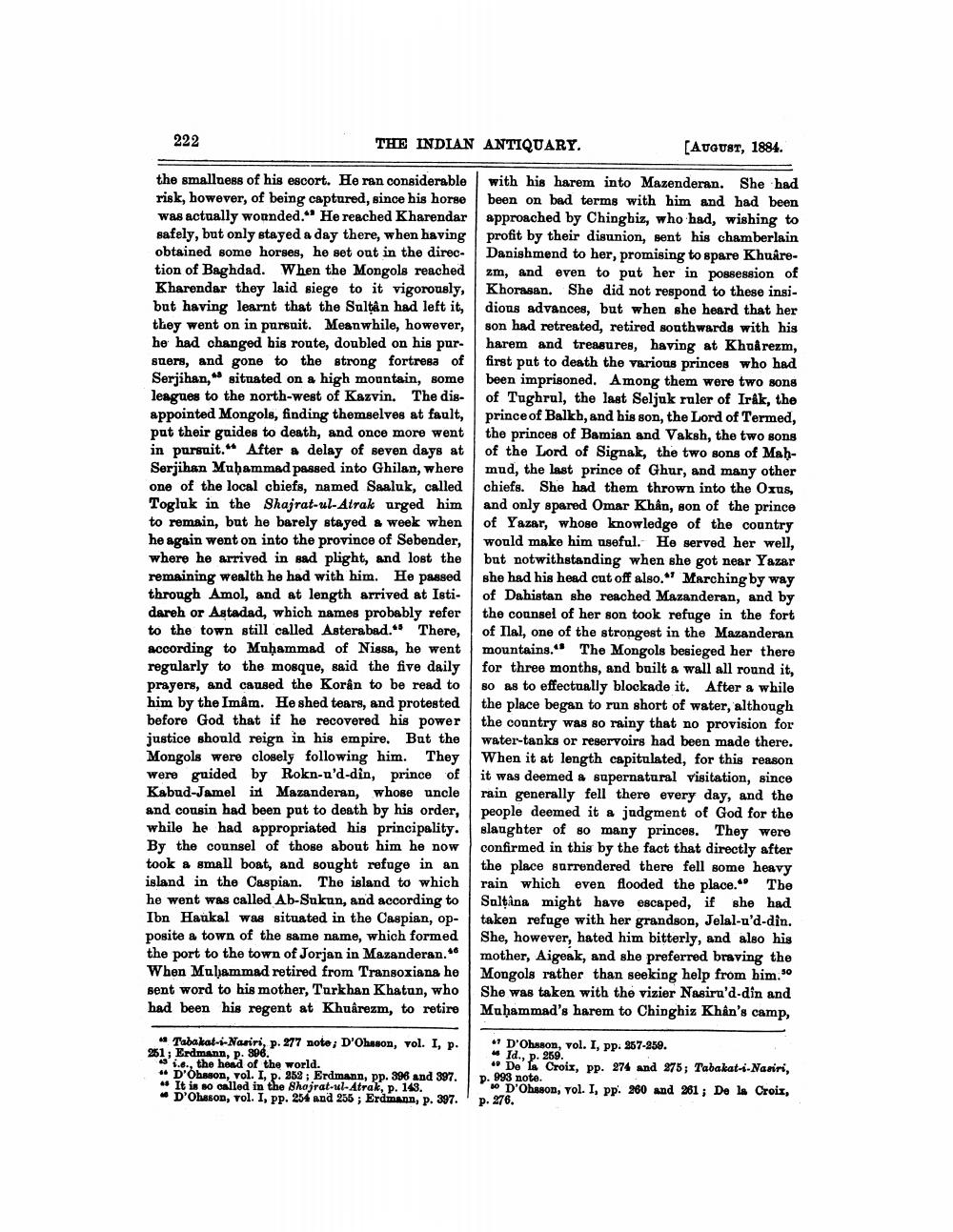________________
222
THE INDIAN ANTIQUARY.
[AUGUST, 1884.
the smallness of his escort. He ran considerable risk, however, of being captured, since his horse was actually wounded." He reached Kharendar safely, but only stayed a day there, when having obtained some horses, he set out in the direction of Baghdad. When the Mongols reached Kharendar they laid siege to it vigorously, but having learnt that the Sultan had left it, they went on in pursuit. Meanwhile, however, he had changed his route, doubled on his pur. suers, and gone to the strong fortresa of Serjihan," situated on a high mountain, some leagues to the north-west of Kazvin. The disappointed Mongols, finding themselves at fault, put their guides to death, and once more went in pursuit. After a delay of seven days at Serjihan Muhammad passed into Ghilan, where one of the local chiefs, named Saaluk, called Toglok in the Shajrat-ul-Atrak urged him to remain, but he barely stayed a week when he again went on into the province of Sebender, where he arrived in sad plight, and lost the remaining wealth he had with him. He passed through Amol, and at length arrived at Istidareh or Astadad, which names probably refer to the town still called Asterabad." There, according to Muhammad of Nissa, he went regularly to the mosque, said the five daily prayers, and caused the Korân to be read to him by the Imam. He shed tears, and protested before God that if he recovered his power justice should reign in his empire. But the Mongols were closely following him. They were guided by Rokn-u'd-din, prince of Kabud-Jamelint Mazanderan, whose uncle and cousin had been put to death by his order, while he had appropriated his principality. By the counsel of those about him he now took a small boat, and sought refuge in an island in the Caspian. The island to which he went was called Ab-Sukan, and according to Ibn Haukal was situated in the Caspian, opposite a town of the same name, which formed the port to the town of Jorjan in Mazanderan." When Muhammad retired from Transoxiana he sent word to his mother, Tarkhan Khatan, who had been his regent at Khuârezm, to retire
with his harem into Mazenderan. She had been on bad terms with him and had been approached by Chingbiz, who had, wishing to profit by their disunion, sent his chamberlain Danishmend to her, promising to spare Khuêrezm, and even to put her in possession of Khorasan. She did not respond to these insidions advances, but when she heard that her son had retreated, retired southwards with his harem and treasures, having at Khuâ rezm, first put to death the various princes who had been imprisoned. Among them were two sons of Tughrul, the last Seljuk ruler of Irák, the prince of Balkh, and his son, the Lord of Termed, the princes of Bamian and Vaksh, the two sons of the Lord of Signak, the two sons of Mahmud, the last prince of Ghur, and many other chiefs. She had them thrown into the Oxus and only spared Omar Khân, son of the prince of Yazar, whose knowledge of the country would make him useful. He served her well, but notwithstanding when she got near Yazar she had his head cut off also." Marching by way of Dahistan she reached Mazanderan, and by the counsel of her son took refuge in the fort of Ilal, one of the strongest in the Mazanderan mountains. The Mongols besieged her there for three months, and built a wall all round it, so as to effectually blockade it. After a while the place began to run short of water, although the country was so rainy that no provision for water tanks or reservoirs had been made there. When it at length capitulated, for this reason it was deemed a sapernatural visitation, since rain generally fell there every day, and the people deemed it a judgment of God for the slaughter of so many princes. They were confirmed in this by the fact that directly after the place surrendered there fell some heavy rain which even flooded the place. The Sultâna might have escaped, if she had taken refuge with her grandson, Jolal-ud-din. She, however, hated him bitterly, and also his mother, Aigeak, and she preferred braving the Mongols rather than seeking help from him." She was taken with the vizier Nasiru'd-din and Muhammad's harem to Chinghiz Khan's camp,
Tabakat---Nasiri, p. 277 note; D'Ohason, vol. I, p. 251; Erdmann, p. 396.
Si..., the head of the world. * D'Ohason, vol. I, p. 352; Erdmann, pp. 396 and 397. * It is so called in the Shajrat-ul-Atrak, p. 143. - D'Ohason, vol. I, pp. 254 and 256 ; Erdmann, p. 397.
D'Ohsson, vol. I, pp. 857-259.
Id., p. 259. * Do'l Croix, pp. 274 and 275; Tabakat-1-Nasiri, p. 993 note.
0 D'Ohason, vol. I, pp. 260 and 261 ; De La Croix, p. 276.




